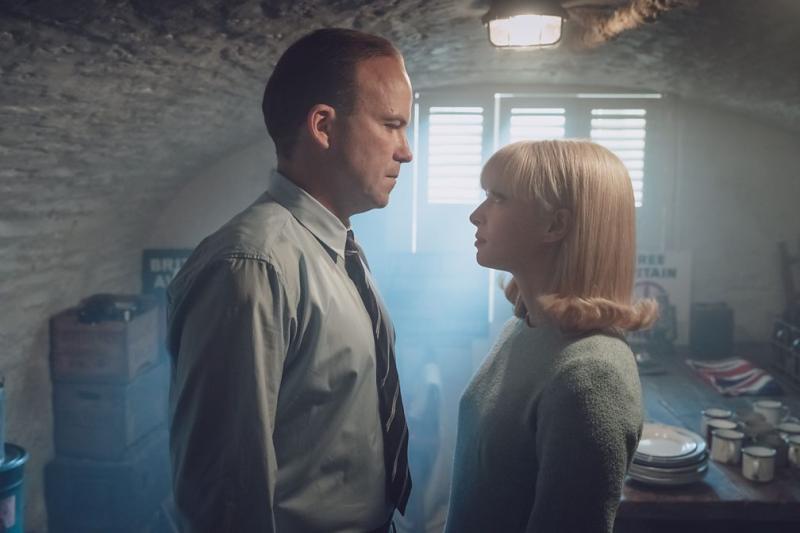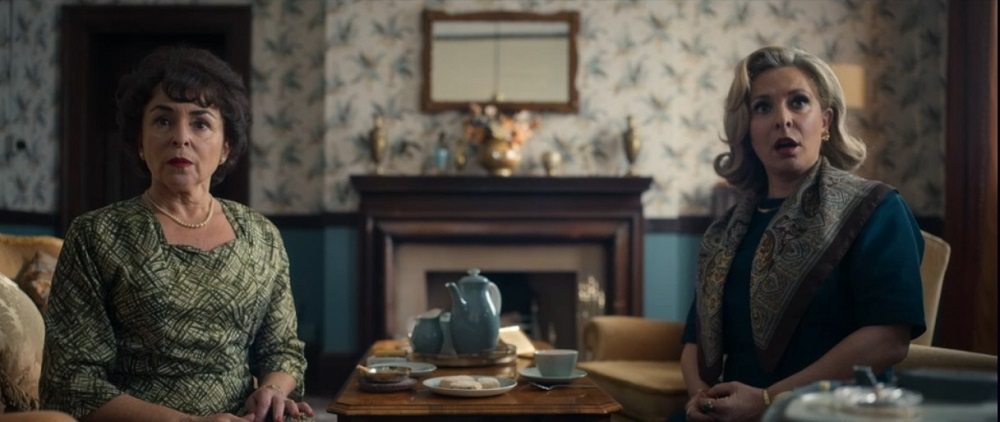Ridley Road, BBC One review - Jewish community fights Nazi nightmare in 1960s London | reviews, news & interviews
Ridley Road, BBC One review - Jewish community fights Nazi nightmare in 1960s London
Ridley Road, BBC One review - Jewish community fights Nazi nightmare in 1960s London
Enlightenment about a resurgence of English Fascism wrapped up in a well-acted thriller

Neo-Nazis held a Trafalgar Square rally under the banner "Free Britain from Jewish Control" in the year of my birth; I had no idea until I watched Ridley Road. Most of us know about the Battle of Cable Street in 1936, but, until now, next to nothing about the Jewish resistance against fascist Colin Jordan and his gang of thugs, some of them cynically recruited from borstals and children’s homes, 17 years after the end of the Second World War.
Sarah Solemani's adaptation of Jo Bloom’s novel plays with the chronology a bit – arsonists did kill a boy in a Jewish theological college, but after most of the other events depicted here – but ticks all the boxes: shabby-chic recreation of the early 1960s, nuanced performances, chilling links with today’s rise of the far right and a thriller element which inevitably goes through the roof in the last episode.
It was a masterstroke to cast 25-year-old Agnes O’Casey as Vivien Epstein, the nice Jewish girl from Manchester whose development as an anti-fascist is mesmerisingly charted. The peroxide transformation is radical, of course, but it’s not just in the looks that Casey compels. She’s more than equal to the acting skills of Rory Kinnear, a chillingly plausible neo-Nazi operator. Anything you don’t believe about his actions, you can check with reality, and some of it turns out to be even more bizarre, like the ritual wedding with Françoise Dior (vividly nasty in Romane Portail's portrayal, though not every word can be made out, and there's a dodgy accent in that episode, from Stephen Hogan as Jordan's American funder George Lincoln Rockwell) where they let their blood drip on to the first page of Hitler's Mein Kampf.  Eddie Marsan only has to be his sympathetic self and enjoyably shouty in the occasional rages as the fictional Soly Malinovsky, giving heart to the cause of the real-life Jewish movement known as the 62 Group, well flanked by Tracy Ann Oberman, stylishly tough, and Allan Corduner as the quiet rabbi turned resistance supporter. You can’t fail to enjoy the performances of 60s star Rita Tushingham as a landlady sucked in by the rhetoric of racism who, like Vivien, goes on a journey, albeit a more sentimentally sketched one, Samantha Spiro as Vivien‘s mother (she has a terrific if short scene with Oberman in the final episode, pictured above), and Tamsin Outhwaite as the ballsy owner of the Soho haidresser’s where Vivien works, adding a splash of 60s colour. The leading young men are attractive: while Gabriel Akuwudike’s racially targeted Stevie deserves a bit more development, Tom Varey is allowed to be interestingly tough as infiltrator of the fascist circle Jack Morris, Vivien’s boyfriend.
Eddie Marsan only has to be his sympathetic self and enjoyably shouty in the occasional rages as the fictional Soly Malinovsky, giving heart to the cause of the real-life Jewish movement known as the 62 Group, well flanked by Tracy Ann Oberman, stylishly tough, and Allan Corduner as the quiet rabbi turned resistance supporter. You can’t fail to enjoy the performances of 60s star Rita Tushingham as a landlady sucked in by the rhetoric of racism who, like Vivien, goes on a journey, albeit a more sentimentally sketched one, Samantha Spiro as Vivien‘s mother (she has a terrific if short scene with Oberman in the final episode, pictured above), and Tamsin Outhwaite as the ballsy owner of the Soho haidresser’s where Vivien works, adding a splash of 60s colour. The leading young men are attractive: while Gabriel Akuwudike’s racially targeted Stevie deserves a bit more development, Tom Varey is allowed to be interestingly tough as infiltrator of the fascist circle Jack Morris, Vivien’s boyfriend.
The pace set by director Lisa Mulcahy is unerring, the dialogue believable, and even the score, by Ben Onono, is a cut above the usual telly drama-series aural wallpaper. Here’s yet another reason to cut the BBC some slack over its apparent cravenness in the face of an increasingly authoritarian and in many alarming if inconsistent ways far-right government.
The future of Arts Journalism
You can stop theartsdesk.com closing!
We urgently need financing to survive. Our fundraising drive has thus far raised £49,000 but we need to reach £100,000 or we will be forced to close. Please contribute here: https://gofund.me/c3f6033d
And if you can forward this information to anyone who might assist, we’d be grateful.

Subscribe to theartsdesk.com
Thank you for continuing to read our work on theartsdesk.com. For unlimited access to every article in its entirety, including our archive of more than 15,000 pieces, we're asking for £5 per month or £40 per year. We feel it's a very good deal, and hope you do too.
To take a subscription now simply click here.
And if you're looking for that extra gift for a friend or family member, why not treat them to a theartsdesk.com gift subscription?
more TV
 theartsdesk Q&A: director Stefano Sollima on the relevance of true crime story 'The Monster of Florence'
The director of hit TV series 'Gomorrah' examines another dark dimension of Italian culture
theartsdesk Q&A: director Stefano Sollima on the relevance of true crime story 'The Monster of Florence'
The director of hit TV series 'Gomorrah' examines another dark dimension of Italian culture
 The Monster of Florence, Netflix review - dramatisation of notorious Italian serial killer mystery
Director Stefano Sollima's four-parter makes gruelling viewing
The Monster of Florence, Netflix review - dramatisation of notorious Italian serial killer mystery
Director Stefano Sollima's four-parter makes gruelling viewing
 The Diplomat, Season 3, Netflix review - Ambassador Kate Wyler becomes America's Second Lady
Soapy transatlantic political drama keeps the Special Relationship alive
The Diplomat, Season 3, Netflix review - Ambassador Kate Wyler becomes America's Second Lady
Soapy transatlantic political drama keeps the Special Relationship alive
 The Perfect Neighbor, Netflix review - Florida found-footage documentary is a harrowing watch
Sundance winner chronicles a death that should have been prevented
The Perfect Neighbor, Netflix review - Florida found-footage documentary is a harrowing watch
Sundance winner chronicles a death that should have been prevented
 Murder Before Evensong, Acorn TV review - death comes to the picturesque village of Champton
The Rev Richard Coles's sleuthing cleric hits the screen
Murder Before Evensong, Acorn TV review - death comes to the picturesque village of Champton
The Rev Richard Coles's sleuthing cleric hits the screen
 Black Rabbit, Netflix review - grime and punishment in New York City
Jude Law and Jason Bateman tread the thin line between love and hate
Black Rabbit, Netflix review - grime and punishment in New York City
Jude Law and Jason Bateman tread the thin line between love and hate
 The Hack, ITV review - plodding anatomy of twin UK scandals
Jack Thorne's skill can't disguise the bagginess of his double-headed material
The Hack, ITV review - plodding anatomy of twin UK scandals
Jack Thorne's skill can't disguise the bagginess of his double-headed material
 Slow Horses, Series 5, Apple TV+ review - terror, trauma and impeccable comic timing
Jackson Lamb's band of MI5 misfits continues to fascinate and amuse
Slow Horses, Series 5, Apple TV+ review - terror, trauma and impeccable comic timing
Jackson Lamb's band of MI5 misfits continues to fascinate and amuse
 Coldwater, ITV1 review - horror and black comedy in the Highlands
Superb cast lights up David Ireland's cunning thriller
Coldwater, ITV1 review - horror and black comedy in the Highlands
Superb cast lights up David Ireland's cunning thriller
 Blu-ray: The Sweeney - Series One
Influential and entertaining 1970s police drama, handsomely restored
Blu-ray: The Sweeney - Series One
Influential and entertaining 1970s police drama, handsomely restored
 I Fought the Law, ITVX review - how an 800-year-old law was challenged and changed
Sheridan Smith's raw performance dominates ITV's new docudrama about injustice
I Fought the Law, ITVX review - how an 800-year-old law was challenged and changed
Sheridan Smith's raw performance dominates ITV's new docudrama about injustice
 The Paper, Sky Max review - a spinoff of the US Office worth waiting 20 years for
Perfectly judged recycling of the original's key elements, with a star turn at its heart
The Paper, Sky Max review - a spinoff of the US Office worth waiting 20 years for
Perfectly judged recycling of the original's key elements, with a star turn at its heart

Add comment